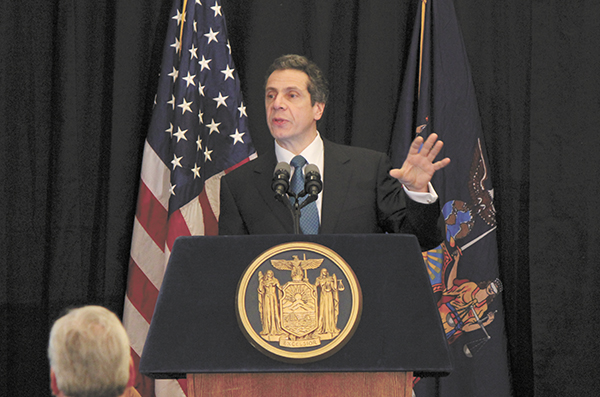
A crowd of about 100 protesters gathered outside the Riverwalk Hotel on Water Street in the city of Binghamton yesterday to rally in anticipation of Gov. Andrew Cuomo’s presentation of the 2011-12 New York State Budget.
Their signs protested various parts of the budget, ranging from support of graduated income taxes to socialized healthcare to curbing hydraulic fracturing of natural gas in the Southern Tier. Rally organizers included the Binghamton University chapter of the New York Public Interest Research Group, Citizen Action of New York, New York State United Teachers and the Alliance for Quality Education.
State and city police were on guard to make sure the protesters stayed off of the hotel’s property.
Cuomo began his speech on closing New York State’s $10 billion budget deficit — an invitation-only event hosted by the Broome County Chamber of Commerce — by announcing that Albany is too political.
“They are voting by their party loyalty as opposed to the best interest of the people of the state,” Cuomo said. “That has to change. We are Democrats. We are Republicans. But we are New Yorkers first and we have to act that way.”
He then went on to explain that the budget “cuts” he proposed were actually not cuts at all. He said that State officials tend to use the term “cut” falsely when the increase is not as large as it could have been. He used the example that some programs were increasing by as much as 13 percent from year to year.
“New York State is out of control because nothing else is increasing by this number,” Cuomo said.
He said as long as average incomes, inflation or bank interest rates were to exceed tax hikes or state spending, the budget would suffice. But, since state citizens currently only bring home an average of 3.7 percent more income than in 2010, the problem has become unsustainable.
Cuomo also suggested the budget deficit has resulted in more than two million people leaving the state.
“In my opinion, property taxes are suffocating people in their own homes,” he said. “Businesses leave, people then leave, there is less revenue for the state, the state then raises more taxes, which causes more businesses to leave. It is that downward spiral that this state is in right now.”
EDUCATION AND THE BUDGET
Though Cuomo spoke of the cuts to education in general, he did not specifically address the 10 percent cut to higher education that will affect the SUNY system. He spoke about education as a whole, saying that the emphasis of the program needs to be about performance rather than money.
“If a school district does well … reward the performance,” he said. “Change the orientation and the mentality of the program.”
Before Cuomo’s speech, Ryan Libby, a junior double-majoring in sociology and environmental studies, said that he felt Cuomo’s budget did not properly address state education.
“He’s cutting $1.5 billion from state schools but giving a $1 billion tax break to the rest of New York State. He just doesn’t seem like someone who cares about education,” said Libby, who represented the Experimental Media Organization/Student Action Coalition and Concerned Binghamton Students at the protest outside the hotel.
In Cuomo’s budget proposal, funding to local education would decrease by $1.5 billion and would let a tax on the wealthiest New Yorkers — worth about $1 billion in state revenue — expire.
Others participating in the rally hoped Cuomo would bring change to the state government.
Monazir Khan, the statewide representative for the Graduate Student Employees Union of SUNY, said that he had attempted to pressure state representatives in Albany to pass a contract outlining the specific duties and benefits for teaching assistants and graduate assistants since 2007.
“TAs and GAs teach 42 percent of classes SUNY-wide,” Khan said. He looked forward to a change in the state’s attitude on speedy legislation involving education.
Libby, Khan and the rest of the protesters were not able to attend the invite-only speech.


